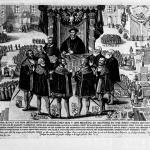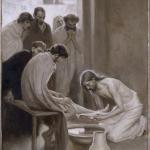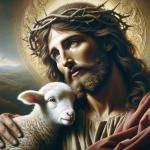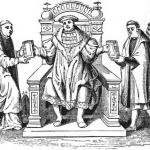Liberalism has had a powerful, and yet destructive, influence on the average American Catholic. There is no doubt about it. Culturally, Catholics have embraced liberalism as a political doctrine, and in doing so, they have brought their politics back into the Church, causing great doctrinal confusion. If we want to repair the harm that has been done, we must be willing to look at liberalism and see how it has hurt our Catholic sensibility.
Liberalism is the creed of individualism; it is the belief that the individual should be free from external coercion, such as from the state, in order to pursue their own private interests (a classical example of this is laissez–faire economics). All individuals are seen as equal (leading to a disregard for hierarchies).
While one might point out that there is a truth involved with liberalism, it is the exaggeration of that truth which is dangerous and yet is the norm of our society. Individualism has led to a disregard to traditional forms of respect. For example, because people are equal, no one should bow before another person (if you do, you indicate some sort of subservience and therefore you present yourself as less than equal to the rightful liberal individual). This has led further to a denigration of honor, so that we have a very limited perspective in how to show it to another, and if you go beyond it, your excessiveness is seen as idolatrous (the range of honor you can show to someone else has decreased through the years, so that anyone who is said to be a follower of someone else is looked upon as a cultist giving adoration to someone who does not deserve it).
If we look to the criticism surrounding President Obama, we see classical liberalism making its case: when President Obama is seen as bowing to someone else, the liberal will cry out in disgust. How dare he bow? Doesn’t he know what that means, that he has lowered himself (and the reputation of the United States) because of it? How can he be seen as a leader if he acts like a servant? Yet – this is exactly the kind of activity that a Catholic should expect from our leaders. A quick look through Holy Scripture shows that the great Patriarchs were among the first to bow before others, even to those who were their own inferiors (as when Jacob bowed to Esau – the one whose birthright Jacob possessed).[1]
Perhaps the greatest criticism has been to Obama’s supporters. Here, liberal have said that his supporters were idolaters worshiping the president. What have they done to get this designation? Have they formed a religious cult around the president? No. All they have done is shown enthusiasm to the man. They know that he cannot solve all the problems of the world, and they also know they disagree with him a great deal on many issues; but they saw in him the potential to change the course of the United States, hoping it would be for the better. Their enthusiasm, their praises, does not, however, get anywhere near the level of a cult; indeed, conservatives laugh at the notion that what we see is anywhere near excessive, when we have a history of courtly honor and praise which makes what happens around the president pale in comparison (compare, for example, the courts of Constantine, Justinian, Charlemagne, Louis IX, or Louis XVI with what we see around president Obama, and we will see Obama’s followers hardly show him much honor, and indeed, they do so in rather limited circumstances).
At the heart of this liberalism is the deadly vice of pride; the ego likes to be lifted up and think itself above everyone else, and never having to give honor or respect to anyone else. While there is a limited form of respect left in our society, it is a kind of respect which is being lost, the more and more this individualism and its ways are encouraged. Road rage, for example, comes about because of the lack of respect people show towards each other while driving. But why would anyone have to show that respect, if everyone is equal and everyone should be free to do as they will? Clearly society is falling apart, and it is this liberal core which is destroying it, rotting us from the inside out. There can be no society based upon individualism, because there is no connection between the individuals themselves to make for such a society. They have become Leibniz’s monads. They believe there is no one else for them to follow than themselves; they have become slaves of their own ego and its pride.
Catholics, once again, should know better. The way to salvation is humility; the one who wants to be greatest will become the servant of all. We must die to the self, if we want to enter real, eternal life. Inordinate passions such as lust can never be satisfied, and so the libertine pursuit for pleasure (which is what they understand happiness to be) can never end. Society holds a common bond because we are not mere individuals. We are connected one with another because of our common nature.
But, as we said earlier, Catholics have been influenced by liberalism. We can see this in the way their devotions have changed over the years. In the 19th century, the word worship was never seen as a word which was meant only for God. Worship, giving someone honor, could be done according to different grades, from relative honor to absolute adoration, with only absolute adoration being given to God. Even in the early 20th century this was understood. Thus, the 1912 Catholic Encyclopedia could say, “The word worship (Saxon weorthscipe, ‘honour’; from worth, meaning ‘value’, ‘dignity’, ‘price’, and the termination, ship; Latin cultus) in its most general sense is homage paid to a person or a thing. In this sense we may speak of hero-worship, worship of the emperor, of demons, of the angels, even of relics, and especially of the Cross.”[2] But within the 20th century, Catholics slowly accepted the liberal leveling of honors, so that the only worship could be that which is given to God. Now most Catholics if asked whether or not they worship the saints will say “no.” Of course, they are right in thinking we do not give adoration to the saints, but they have ignored the great diversity possible with worship, and have readily given in to the liberal interpretation of worship as being idolatrous if it is given to someone other than God. This has, however, has influenced our spirituality. Private Catholic devotions give far less reverence to the saints, with far less practices of traditional piety (kissing icons, incensing the statues, singing hymns to the saints, etc) because these forms of reverence are inherently recognized as being worship. Indeed, liberal Catholics will be among the first to agree that many forms of Catholic piety were excessive and idolatrous (with the only given defense being the people who performed such rituals were ignorant and therefore, worthy of pity not condemnation). What was said in public about public actions and rituals gets turned in on Catholicism and their rituals.
This difficult finds itself also in the way the ordinary American Catholic treats the bishops of the Church. While the conservative knows how to give respect, and understand the limitation implicit in a position of authority, they also know that authority is to be respected and given its due place. Bishops can indeed do wrong, just like anyone else. But they are to be respected, their position given due consideration, and the response given to them should be one which demonstrates this respect, showing that their words were contemplated and not just dismissed outright. Liberals, on the other hand, are quick to dismiss authority; the only authority they cite is one which agrees with the positions they already accept, and they are unwilling to follow an authority if there is any disagreement between them and that authority. Liberals use authority for their own gains, but without any actual desire to serve that authority themselves. Of course, the liberal will point out the history of abuse within the Church and use that to indicate why authority should be dismissed. But who is convinced by such an ad homimem? Even a conservative will recognize the need for reform and constant pursuit for excellence, and if there is an abuse in authority, they will agree that it needs to be rectified, but they will not agree that it means all authority is abuse and needs to be rejected (just as the presence of alcoholics in society does not mean alcohol should be forbidden to society).
It has once been said that liberalism is a sin; while I would not go that far, it is true that the principles of liberalism lead to sin. The solution, of course, must not be some extreme counter-reaction to liberalism. The solution is not an extreme authoritarian society which gives its citizens no personal freedom. There has to be, as with all virtues, a middle way, and for Catholics, the way forward and out of this quandary is to look towards the government of God over the earth. What freedoms does God give? What restrictions does God place on society? How and why are each given? That, not political liberalism, must become the framework of Catholic dialogue in the 21st century if we want true reform in the Church.
[1] “And Jacob lifted up his eyes and looked, and behold, Esau was coming, and four hundred men with him. So he divided the children among Leah and Rachel and the two maids. And he put the maids with their children in front, then Leah with her children, and Rachel and Joseph last of all. He himself went on before them, bowing himself to the ground seven times, until he came near to his brother” (Genesis 33:1 -3).
[2] F. Cabrol. “Christian Worship,” In The Catholic Encyclopedia (New York: Robert Appleton Company, 1912). Retrieved December 4, 2009 from New Advent: http://www.newadvent.org/cathen/15710a.htm .
















